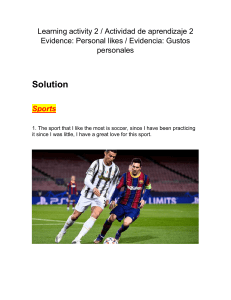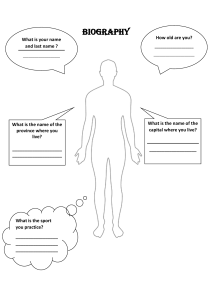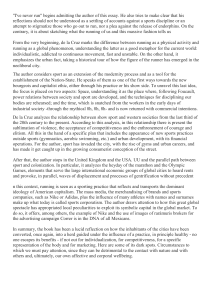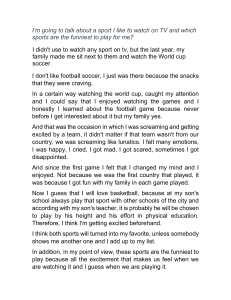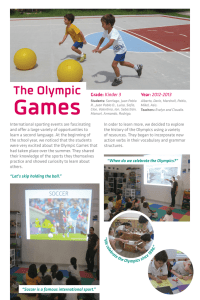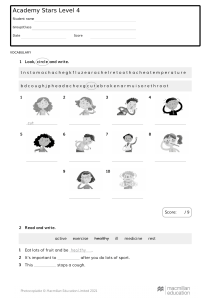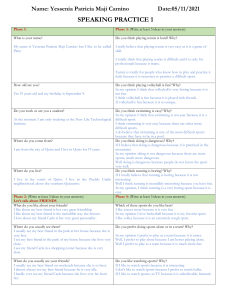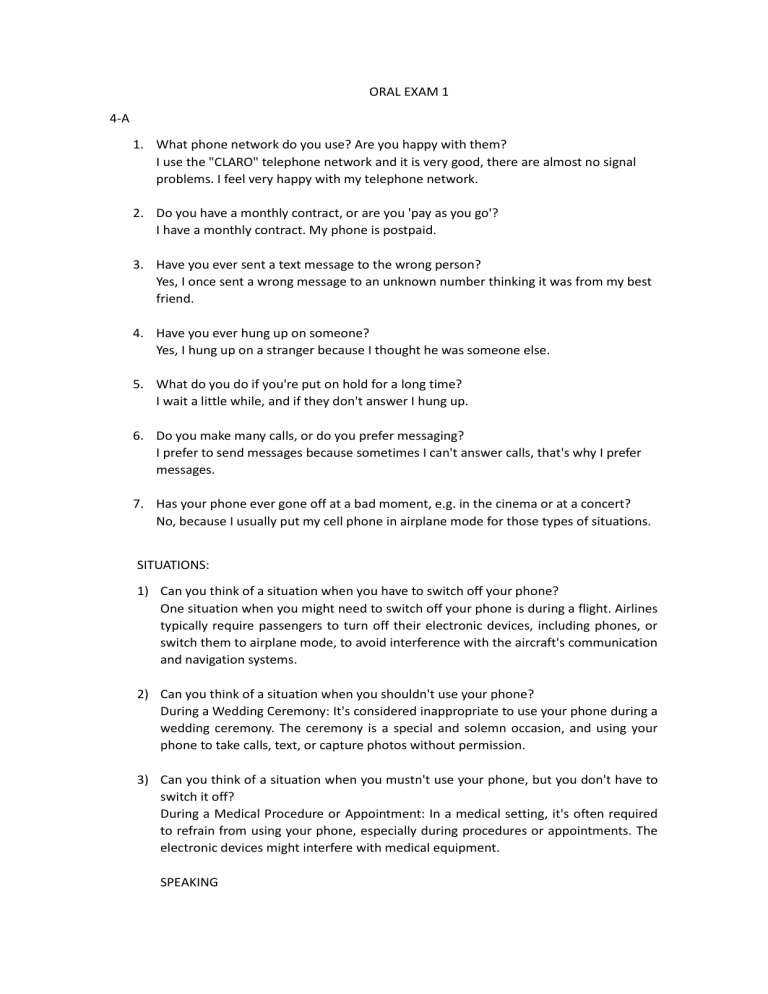
ORAL EXAM 1 4-A 1. What phone network do you use? Are you happy with them? I use the "CLARO" telephone network and it is very good, there are almost no signal problems. I feel very happy with my telephone network. 2. Do you have a monthly contract, or are you 'pay as you go'? I have a monthly contract. My phone is postpaid. 3. Have you ever sent a text message to the wrong person? Yes, I once sent a wrong message to an unknown number thinking it was from my best friend. 4. Have you ever hung up on someone? Yes, I hung up on a stranger because I thought he was someone else. 5. What do you do if you're put on hold for a long time? I wait a little while, and if they don't answer I hung up. 6. Do you make many calls, or do you prefer messaging? I prefer to send messages because sometimes I can't answer calls, that's why I prefer messages. 7. Has your phone ever gone off at a bad moment, e.g. in the cinema or at a concert? No, because I usually put my cell phone in airplane mode for those types of situations. SITUATIONS: 1) Can you think of a situation when you have to switch off your phone? One situation when you might need to switch off your phone is during a flight. Airlines typically require passengers to turn off their electronic devices, including phones, or switch them to airplane mode, to avoid interference with the aircraft's communication and navigation systems. 2) Can you think of a situation when you shouldn't use your phone? During a Wedding Ceremony: It's considered inappropriate to use your phone during a wedding ceremony. The ceremony is a special and solemn occasion, and using your phone to take calls, text, or capture photos without permission. 3) Can you think of a situation when you mustn't use your phone, but you don't have to switch it off? During a Medical Procedure or Appointment: In a medical setting, it's often required to refrain from using your phone, especially during procedures or appointments. The electronic devices might interfere with medical equipment. SPEAKING SEND OR RECEIVE MESSAGES IN THE CINEMA 1) Do you know people who do this? Do you ever do it? Yes, my cousin usually talks back to her partner at the movies, which is a little annoying. I did it once because I had an emergency. 2) What does it annoy you, or do you think it's OK? I annoy it because the light from the cell phone screen distracts me. 3) If it annoys you, what do you think these people should or shouldn't do? I think they should have their cell phone on vibrate and leave the room to answer it if it is important. They should not respond there out of respect for others. READING 1. When shouldn’t you greet someone with a kiss? In professional settings, formal events, or with people you don't know well, it's often more appropriate to opt for a handshake or other culturally accepted forms of greeting. 2. What shouldn't you do on public transport? You should not have loud conversations or phone calls, eating strong-smelling food, ignoring personal hygiene, and engaging in inappropriate behavior. 3. Should you recline your seat on an aero plane? I think that you should not recline your seat on the plane to show good manners, because it makes the person sitting behind uncomfortable. 4. When you should you give up your seat on public transport? I think the seat should be given up for good manners, for older people, for people with disabilities and people carrying small children. 5. Should you ever start eating before everyone is served? For good manners, you should wait until everyone is seated at the table to start eating, in addition to some families praying before eating and waiting with respect for other people. a. Where your answers the same as the advice Debrett’s gives? Yes, I answered almost the same as the British Publisher. b. Read the article again and look at the highlighted phrases. Try to explain them in your own words. - Kissing is not appropriate in many professional situations: Kissing is not appropriate in many professional situations because workplace interactions are usually formal and should maintain a level of professionalism. Physical contact, like kissing, can be misunderstood, make people feel uncomfortable, and doesn't align with the behavior standards at work. - - - - It's inconsiderate to eat smelly food in a closed environment’s: Rude to eat strong-smelling food in a closed space because it can bother other people. The strong smells from the food can be noticed by those nearby, causing discomfort and even making them feel unwell. Being considerate of others is important in closed environments like offices or public transportation to maintain a pleasant and respectful atmosphere. Don't monopolize the armrest: Don't hog the armrest. It's important to share space to ensure comfort and courtesy. If one person takes up the whole armrest, it can make the other feel uncomfortable and cramped. It is also rude to aggressively decline the offer of a seat: Aggressively declining a seat offer is considered rude as it may seem impolite and disrespectful. Politely accepting shows appreciation for others' consideration, even if the seat isn't needed. Maintaining positive interactions and avoiding unnecessary tension is key in social situations. It is important to wait for the host, hostess (or, in a restaurant, the other diners) to give their permission to start eating. This is due to courtesy and etiquette. By waiting, we show respect towards the person organizing the event or the venue. c. Do you agree with the advice? Do you think Debrett’s reasons are good ones? I agree with the advice. I think Debrett's reasons are good, because he explains to us in various situations what applies and how good manners are used. d. Ask and answer the questions with the partner. - How do you think is appropriate to greet a male or female friends? I think it is appropriate to greet with a kiss, because of the trust you have with your friends. - What else do you think people shouldn't do on public transport? The people should not have loud conversations or phone calls, eating strongsmelling food, ignoring personal hygiene, and engaging in inappropriate behavior. - What do you think passengers ought not to do on planes? They should not listen to loud music, recline their seats, and occupy the entire armrest so as not to reduce the space of the other passenger. - How else do you think it's appropriate to help elderly people? I think you can help them cross the street, buy food and help them with directions to where they are going. - What else do you think you should ask your host on hostess for permission to do? I think you to talk about a specific topic, make a toast and wait to eat. - Do you think manners are important? Why (not)? Yes, I think they are very important, because they help us relate to respect with the other people. LISTENED A. 4.9 1. Her mother-in-law is very rude because she criticizes her cooking. She gets angry because her food is delicious, and she is a good cook. 2. His brother brings his dog and he and his girlfriend don't like dogs. In addition to that, they decorated his house and garden, and they believe that the dog destroyed it. 3. her nephew is really wild and come to our house, he just shouts all the time, jumps on the furniture, makes a mess in the kitchen, and he even writes on the walls QUESTIONARE: Good manners? Bad manners? Not important? 1. When greeting people... - use more formal language when talking to an older person. I think it is good manners because it is more respectful. kiss somebody on both cheeks when you meet them for the first time. I think it is inappropriate because there is not enough trust, and it can be disrespectful. use your partner's parents' first names. I don't think it's important because that should be the couple's decision. 2. Men and women - a man should... - pay for the meal on a first date. it's not important. I don't think you have to do it out of obligation, only if you want to do it. - hold the door open for a woman or wait for her to go through the door first. I think it is good manners because it is considerate and respectful. - accompany a woman home. I think it is good manners, because it is considered, and it is also good for the girl's safety. 3. When you're invited to somebody's house for a meal... - take a present. I think it is good manners, because it is considerate, and it is also a form of affection towards the host. - take your shoes off when you arrive. It's not important, because in some houses they don't consider it important, it's only if you want to do it. - criticize the food (e.g. if it's too cold, salty, etc.). I think it's bad manners because you're a guest and shouldn't criticize the food that the invite. - send a message the next day to say thank you. I think it's good manners, is considerate and respectful. 4. When you're having a meal with friends in a restaurant... - complain that the food isn't very good. I think it is inappropriate because the important thing is the company of friends. - insist on only paying for exactly what you ate or drank when the bill is being divided up. I don't think it's important only if you want to do it, you pay more money, but only yours. - be very affectionate with your partner. I think it's rude because it can make other people uncomfortable. 5. On social networking sites... - - post a photo or video clip of a friend without asking their permission. I think it's rude because it can make other people uncomfortable and it's not respectful. make a negative comment about somebody's photo. I think it's bad manners because it's rude and disrespectful. post a private message or conversation. I think it's bad manners because it's rude and disrespectful. 4-B 1. SENTENCES: - I can type fast. - I can play a musical instrument. - I can’t do yoga. - I can’t ski. - When I was ten years old, I could swim. - When I was ten years old, I could ride a bike. - When I was ten years old, I couldn’t dance salsa. - When I was ten years old, I couldn’t take good photos. 2. TOPICS. A. something you wish you could do. I would like to be able to learn to speak French, it has always been my dream. I would like to know France and be able to communicate well. B. something you've tried to learn but have never been able to do well. I would like to be able to learn to ride a skateboard, when I was 10 years old, I tried to learn but I didn't have much balance. I can only ride a bicycle. C. something you learned to do after a lot of effort. I was able to learn to cook after a lot of effort. I could chop vegetables and meats, but I was not good with the flavour of the food. He always cooked very salty or very sweet. After a long time, I learned the quantities and was able to do it. D. something you can do but wish you could do better. I can play the piano. But I would like to learn more chords and be able to learn more songs and melodies. E. something he believes all young people should be able to do before finishing school. I believe that everyone could know how to play a musical instrument because that helps them improve their abilities. PRONUNCIATION: I've never been able to dance. I've never been able to speak French. She hates not being able to drive. She hates not being able to cook. Will you be able to find it? Will you be able to afford it? He'd loved to be able to snowboard. He'd love to be able to windsurf. I love being able to understand everyone. I love being able to speak everyone. They haven't been able to finish. They haven't been able to come. LISTENING: A. I believe Malcolm Gladwell because I believe that it takes much more than concentration to learn something, like learning the theory and continuous practice of what you are learning. B. I think that Matt gave up so quickly because he couldn't concentrate or because maybe he needed to learn the basic theory to know how to play the trumpet e. Yes, I think that Matt continues learning to play the trumpet because when he reached 20 hours, he felt optimistic and thought that with more time he would learn everything he needed. SPEAKING: How well do you think you’d be able to do these things after learning for 20 hours? 1. Play a musical instrument. I think I’d be able to play a musical instrument after 20 hours, but at a basic level and with simple melodies. 2. Speak a new language. I believe that I wouldn’t be able to learn a new language in 20 hours because it takes a lot of practice to be able to speak it well. 3. Draw a portrait. I think I’d be able to learn to draw a portrait after 20 hours, but simple images and at a basic level. 4. Drive. I think I’d be able to learn to drive after 20 hours, but I wouldn't be able to get a license, I would just learn the basics. 5. Design and build a website. I think I’d be able to learn how to design and build a website after 20 hours and grow it in the future. 6. Take professional-quality photos. I don't think I would be able to learn to take professional quality photographs in 20 hours because it takes a lot of practice to be able to use the camera well. 7. Cook a three - course meal. I think I’d be able to learn to cook a three-course meal after 20 hours, but simple dishes that are easy to prepare. 8. Dance the tango. I don't think I’d be able to learn to dance the tango in 20 hours because it takes a lot of practice to learn all the dance steps. 9. ski or windsurf. I think I’d be able to learn ski or windsurf. after 20 hours, but at a basic level and with a professional to help me. 10. give first aid. I think I’d be able to learn give first aid after 20 hours, but at a basic level and with a professional to help me. VOCABULARY B Answer the question 1. What music do you listen to if you feel depressed? I listen to romantic music or calm music. 2. What do you think is the most exciting sport to watch? In my opinion, the most exciting sport I have seen is motocross or car racing because they are extreme adrenaline. 3. What's the most amazing scenery you’ve ever seen? The most amazing landscape I have ever seen is a sunset, I like the colors of the sky. 4. Have you ever been disappointed by a birthday present? Yes, one time they gave me socks and I wasn't that excited, but I did feel grateful. 5. Which do you find more tiring, close shopping or food shopping? It makes me more tired to go shopping for food because I'm a little indecisive. 6. What's most embarrassing thing that's ever happened to you? The most embarrassing thing that has happened to me was bumping into someone I didn't know on the street. 7. Are you frightened of heights? No, I really like high altitude sports. 8. Do you usually feel very tired in the morning? Sometimes it depends on the activities you do the day before. 9. What's the most boring film you've ever seen? Until now I have not seen a movie that has bored me, they always have some lesson. 10. Do you ever get frustrated by technology? Yes, I have felt frustrated when the internet is cut off at home. READING AND SPEAKING A. How long have you been learning English? I have been learning English for a year. B. Has anyone ever given you a useful tip which has helped you learn? Yes, they told me to learn the verbal forms and watch movies or series in English. C. Do you do any of these things? Yes, I changed the language of my cell phone to English, and I also did something that I like in English, I like to read and I bought books in English. f. Sentences. - I'm teaching myself Spanish. His teaching himself Spanish. - We introduced ourselves. They introduced themselves. - He taught himself to play the guitar. She taught herself to play the guitar. - He often talks to himself. I often talk to myself. - I really enjoyed myself last night. We really enjoyed ourselves last night. g. Talk to partner. - Which of the tips in b do you think are the best for learning English? Are there any you don't think would work for you? Changing the language of electronic devices, also doing things you like in English. The advice that would not work is to have a partner who speaks English. - Are there any tips that you could easily put into practice? If you could put into practice the advice of learning English through the lyrics of the songs, analyzing their content and singing them again later. - What other things do you do to improve your English outside class (e.g. visit chat websites, listen to audiobooks)? Outside of my English classes I use chat websites, listen to songs in English and watch series and movies in English. VIDEO LISTENING PART 2 Why does Alex mention a completely new adventure? Because he thinks that every language, he learns is a new world, he meets different people and experiences. Why does Alex mention Greek and German? Because he has an emotional connection with both languages, with Greek because of his grandmother who was from there and with German because he likes it. Why does Alex mention Chinese and Slovene? Because he would like to learn Chinese in the future because he finds it very interesting and he would also like to learn Slovene because of the international conference for polyglots that will take place in Slovenia. Why does Alex mention British and Irish language, a recent trip to Wales Russian? Because he always wanted to learn Welsh and Irish, he went to Gales, and he loved that everything was in two languages. he wants to learn Gales someday. About Russian he says that it was the most difficult language he learned, so the alphabet is completely new. Which makes it difficult to memorize. Why does Alex mention YouTube, vocabulary, and grammar? Because he believes that YouTube videos helped him learn everything about the language, what he taught him to learn grammar and vocabulary. REVISE AND CHECK 1. In Peru, especially in cities like Arequipa, there are different ways to get around. We have buses that go everywhere, but sometimes they can be really crowded and slow, especially during rush hour. Then there are combis, which are smaller vans that follow specific routes. They're faster but can be uncomfortable if they're packed. Also, some people use taxis when they need to go somewhere quickly, but they can be expensive. Overall, each type of transport has its advantages and disadvantages, and it depends on where you're going and how much money you have. 2. People often talk about stereotypes of men and women. They say men are supposed to be tough and not cry, while women are supposed to be 3. good at taking care of the house and cooking. I don't think these stereotypes are always true. Some men are really sensitive and cry, and some women aren't interested in cooking or cleaning. Everyone is different, and it's not fair to judge people based on these stereotypes. 4. In Peru, there are things that are considered good manners and things that aren't. For example, it's polite to greet people with a kiss on the cheek or a handshake, especially if you're meeting them for the first time. It's also important to say "por favor" (please) and "gracias" (thank you) when you're asking for something or receiving something. On the other hand, it's considered rude to be late to a meeting or to interrupt someone when they're speaking. It's all about showing respect for others. 5. There's something I've always wanted to do but never been able to. I've always wanted to learn how to surf. I think it would be amazing to ride the waves and feel the rush of adrenaline. But every time I try, I end up falling off the board and getting water up my nose! It's frustrating, but I'm determined to keep trying until I get it right. One day, I hope I'll be able to catch a wave and ride it all the way to the shore 5A What your favorite sport? My favorite sport is basketball. Do you play? Yes, I play basketball since 8 years. VOCABULARY In which sport …...? 1. 2. 3. 4. 5. 6. 7. 8. 9. 10. Can you do the butterfly. Swimming. is there a shot called and slam dunk. Basketball. Is the person who throws the ball called the pitcher. Baseball. Are there two teams of 15 and a ball that isn't around. Rugby. Do you hit the ball over a net on a table. Table tennis (Ping Pong). Do players walk about 8 kilometres during a game, and never run. Football (Soccer). Are there two teams of 6, who play on ice. Ice hockey. Are there four main tournaments: in Melbourne, Paris, London, and New York. Tennis (referring to the Grand Slam tournaments: Australian Open, French Open, Wimbledon, and US Open). Can you do different activities, e.g. running, high jump, javelin, etc. Track and field athletics. Have Brazil won more World Cups than any other country. Football (Soccer) World Cup. SPEAKING 1) Do you like sport? Yes, I like sport. It´s very funny. 2) What’s sports do you do? I play basketball and cycling. 3) How often do you do a sport? I often play basketball, 2 or 3 days a week and I sometimes cycling on vacation. 4) Have you ever won a cup or a trophy? 5) Yes, we once won a trophy playing basketball with my team, we came in second place. 6) Have you ever been injured dying sport? Yes, I once sprained my foot playing basketball. 7) Do you prefer doing a sport or watching sport? I prefer to do a sport because it is more fun and exciting. 8) How many hours do you spend a week watching a sport on TV, or following it online? I only watch sometimes; I spend like 1- or 2-hours watching basketball games. 9) Do you go to watch a local sports team? Yes, I like to watch the Melgar football team's games. 10) What's the most exciting sports event you have been to? The most exciting event I have attended was the final of the cup for the local Peruvian teams. 11) Do you think that there are good sports facilities in your town? Yes, I think that there are good sports facilities in Arequipa for different sports such as the international club or stadiums such as the UNSA stadium or the Umacollo stadium. 12) Do you think physical education should be optional or compulsory at school? I think that physical education should be mandatory because it helps us stay healthy and discover the sports that we might like. 13) Do you think there is too much (or not enough) sport on TV? I think there is sport on television, but not enough. There should be more match broadcasts to learn about the different sports. READING 1. Read the article again. With a partner, explain why the following examples are mentioned. Paragraph 1: Cristiano Ronaldo's right foot and Serena Williams's ball The footballer Cristiano Ronaldo always steps on the pitch with his right foot first. And Serena Williams always bounces the ball five times before a first serve and twice before a second serve. Paragraph 2: lucky golf balls and lucky charms In one experiment people were told that they were given a lucky ball and played very well. In another experiment, people who were allowed to wear their lucky charm performed better on memory tests than people who didn't have it. Paragraph 3: adrenaline and other chemicals Sports rituals can cause the release of adrenaline and other chemicals that help the athlete concentrate better. Paragraph 4: two players with the same superstition The psychologist tells the story of a professional soccer club where two players had the same superstition: both had to be the last to leave the locker room before the game. 2. Talk to a partner. • Do you know of any other sports players who are superstitious? What do they do? If the tennis player Rafa Nadal repeats a series of gestures before and during each match, he does not like to step on the white lines or tries to change rackets every eight games. • Do you have any superstitions, e.g. when you are playing or watching sport, or where you do an exam, or when you travel? Yes, when I am going to take an important exam, I always listen to relaxing music for 5 minutes before the exam and when I travel, I always make the sign of the cross before leaving the house. LISTENING Do you think being a football referee is a difficult job? Why? Yes, I think it is a difficult job, because the referee has to know the rules of the game in addition to making good decisions so that the game is fair. 1. Do you agree with the referee when he says, 'I think fair play does exist - the players who cheat are the exceptions.' Is it also true of other sports? Yes, because there are always players who cheat but most sports have good referees who ensure that the game is fair. 2. Are there any sportspeople in your country who are well known for cheating? What kind of things do they do? I don't know, in general the games are always fair and with fair play. 3. Do you think new technology makes a referee's job easier or more difficult? Why? Yes, because they make their decisions and the application of the rules fairer and the game more precise. 4. Would you like to be a sports referee (or umpire)? Why (not)? Maybe, but I think that game decisions and fairness are complicated and that would make me believe that I would not like to be a referee. SPEAKING: You are going to sell your teacher an anecdote. Choose two of the following topics and plan what you are going to say. Use past, simple, past present, and past perfect. Write it in simple words in 2 paragraphs as if you were an English student. Tell your teacher about a time when you got lost. Where were you going? How you traveled? Because you got lost? What happened in the end? example telling an anecdote Starting with an anecdote, I'm going to tell you about a time when... This happened a few years ago... When I was younger,... Starting with an anecdote, I'm going to tell you about a time when I got lost. This happened a few years ago when I was on a school trip to a nearby museum. It was a sunny day, and I was excited to explore. We traveled by bus, chatting with friends along the way. However, when we arrived, I got separated from the group while looking at an exhibit. Because I got lost, I felt a bit panicked at first. I wandered around, trying to find familiar faces, but everything looked unfamiliar. Eventually, I found a museum staff member who helped me locate my group. It turned out they had moved on to another section without realizing I wasn't with them. In the end, I was relieved to be reunited with my classmates and teachers, and we continued our museum adventure together. 5B 1) Where did Tiffany and Kristina meet their partners for the first time? Tiffany: In Tiffany's story, she encounters a man at the supermarket when she mistakenly thinks he is trying to steal her car. They have a brief interaction where she realizes he is the owner of the car parked next to hers. Kristina: In Kristina's story, she meets Matt, her eventual partner, when she goes to a clinic for acupuncture treatment to alleviate her back pain. Matt, who is also a personal trainer and studying Chinese medicine, is the acupuncturist at the clinic. Think of a couple you know well, e.g. Your parents or friends. How did they meet? My uncles met at school and have been married for 8 years. Do you know any couples who met in unusual circumstances? If I know a couple, my cousin and her boyfriend met while traveling by plane, they started conversations during the flight because he was afraid of flying and my cousin helped him distract himself and they discovered a connection that continued beyond the trip. GRAMMAR: Read to text about John talking about how he met his partner. Where did they meet? Was it a romantic meeting? John met his partner at the school where he was working in Indonesia. It wasn't necessarily a romantic meeting at first, as it started with an accidental collision in the corridor, but it eventually led to a friendship and later blossomed into a romantic relationship. T (True) T (True) F (False) - She didn't usually arrive on time; she was often late for class. T (True) T (True) F (False) - She didn't help him; she ran off laughing. T (True) F (False) - They have been married for 12 years, not 10. F (False) - She didn't help him; she ran off laughing. F (False) - They've been married for 12 years. Look at three extracts from the listening. Answer the questions with a partner. I used to be a teacher... She didn't use to be very punctual... We sometimes used to have tea or a beer together... 1. When do we use used to? How do we ask questions? We use "used to" to talk about past habits or states that were true in the past but are no longer true in the present. To make questions with "used to," we usually invert the subject and "used to" in questions. For example: Did you used to be a teacher? Did she used to be very punctual? Did you used to have tea or a beer together? 2. Are these things probably true now? No, these things are not likely true now. The use of "used to" implies that these were past habits or situations that are no longer the case in the present. Therefore, it suggests that John is no longer a teacher, she is no longer unpunctual, and they no longer have tea or beer together. PAST AND PRESENT HABITS: - What did you use to have for breakfast? What do you usually have now? I used to have oatmeal for breakfast with cocoa, milk, and cereal. Now I have a cup of coffee with fruit salad and a sandwich for breakfast. Is there a TV programme you used to be addicted to? What kind of programmes do you usually watch now? Yes, I remember that I really liked Phineas and Fer, a Disney cartoon program and now I usually watch series or movies on Netflix or Amazon. No specific program. Think of one of your close friends. Ask and answer the question with a partner. 1. How long have you known him/her? I have known my best friend for 1 year. 2. Where did you meet? We met at university; we studied the same degree. 3. Why do you get on well? We get along well because we like the same things, hobbies, and activities. 4. What do you have in common? We study the same career and we both like sports. 5. Do you ever argue? What about? We do argue several times because we have different opinions on some issues, but we talk about it and reach an agreement. 6. How often do you see each other? Almost every day when we are at the University. 7. How do you keep in touch? See you in person, calls and messages. 8. Have you ever lost touch? Why? When? Yes, once on vacation because we were just starting to be friends and I changed my phone number. 9. Do you think you'll stay friends? Yes, our friendship is very strong, I consider him as part of my family. What four letters can you put after these people words to far an abstract now?
